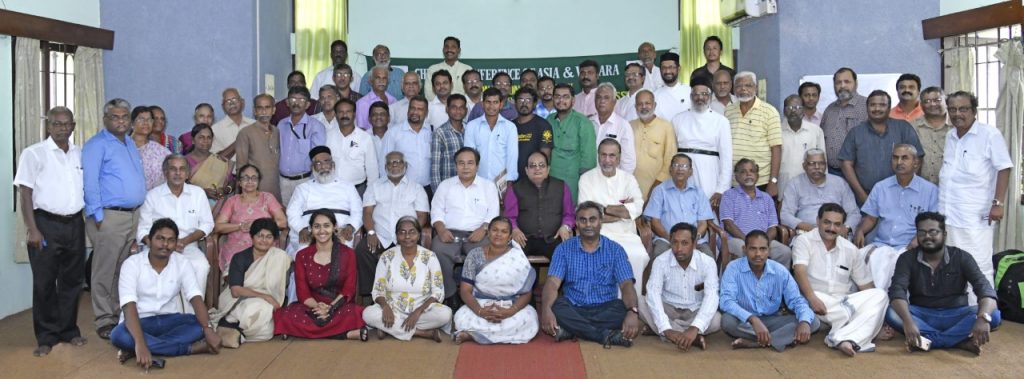“Prophetic Witnessing of Embracing the Stranger is a Liberative Engagement”, affirms the AMC national follow-up consultation.

“Our task is to open the closed doors to embrace the strangers, which is a liberative engagement. Contextually, the re-interpretation towards embracing the stranger is not an option, but a theological mandate to meet the needs”, affirmed the participants of a national follow-up consultation of the Asia Mission Conference (AMC) -2017 of the Christian Conference of Asia (CCA).
Organized jointly by the Christian Conference of Asia (CCA) and Vichara, an ecumenical think-tank based in the south Indian state of Kerala, the consultation focused on a sub theme of the AMC, ‘Embracing the Strangers and Prophetic Witnessing’.
The consultation was held at the Sophia Centre of the Orthodox Theological Seminary at Kottayam, Kerala from 19 to 21 June 2018. More than ninety participants from various parts of India attended the Consultation.
“Missiologically, embracing a stranger has been taken as one of the mission hermeneutical paradigms in the 21st century. Our understanding of mission has been changing, widening its scope and making paradigm shifts in different contexts. If this shift is taken seriously as mission hermeneutical paradigm in the Asian Churches, it will become a transforming mission not only in Asia, but also all over the world", the consultation observed.
The Consultation sought to understand and embrace the vulnerable “strangers” who can be categorized as refugees, internally displaced people, victims of human trafficking, and migrant workers who are all deprived of their inherent rights and dignity.
Bishop Dr. P. C Singh, president of the National Council of Churches in India (NCCI) and the Moderator of the Church of North India, inaugurated the consultation.
Bishop Singh, who is also a member of the Executive Committee of CCA, stated in his inaugural address that “embracing the stranger” included wielding a wider ecumenical instrument of interfaith communities tackling the issue together, and that it was a Christian missiological affirmation and mandate.
Renowned Orthodox theologian Rev. Dr. K. M. George, said that there were changes in perceptions of hospitality in ‘embracing the stranger’ and the hospitality of God was unconditional, open to strangers, the weak, vulnerable, oppressed and outcast, while our human hospitality was conditional and limited.
Dr. K.M George further added that “the challenge is to reinterpret the idea of hospitality, and to rethink the implications of hospitality in the face of increasing geo-political changes today”.
The thematic address delivered by Rev. Dr. Ngur Liana of CCA expounded various dimensions of 'embracing the stranger and prophetic witnessing' in the Asian contexts.
Dr. Ngur Liana laid emphasis on the need for the theological vision to “engage in prophetic witnessing together for embracing the strangers” in the circumstances of escalating violence, terrorism and xenophobia. He shed light on God as a “migrant” God, Jesus Christ as a “migrant” and a “refugee” who identified with the strangers, and the Holy Spirit as a God who was with the strangers, co-suffering in their suffering and giving hope in times of hopelessness.
Addressing the concerns of the migrants and strangers, Dr. Michael Tharakan, a well-known social scientist, described the history of migration and the conflict between the nomadic and sedentary people.
Dr. Tharakan analysed migration as “a strategy or combination of strategies that enhance(s) access to resources; the rational approach to the issue would be to understand the dynamic relations that influence migration”.
He further added that “an inclusive approach would lead to the admission that the world’s resources are open to all and that ‘the whole world is for the whole world’ thus enabling a cooperation between the sedentary and nomadic people”.
Rev. Dr. Daniel Premkumar, who led the Biblical reflections, emphasized the need to “incarnate/embody ourselves in the struggles of the stranger” especially as people shared the same web of salvation and obligation.
In a presentation on ‘Embracing the Strangers and Church’s Mission’, Rev. Dr. P. G. George, a professor of the Old Testament gave a refreshing understanding on migration from the perspectives of the Old Testament and the New Testament . He narrated how the strategically placed divides in the Bible could be interpreted in the perspective of migrants. He said that “immigrant theology must be constructed or articulated as an Asian contextual theology as well as one of the contextual theological trends and see it from the perspective of the strangers” .
Rev. Dr. George, a former Dean of the Senate of Serampore University, further added that “Migration is no longer an aberration but a norm now. If the church represents the kingdom community, it is the responsibility of the church today to serve the people of God irrespective of their identity. We need to come out of our existential pathos, and what we need is imaginations to do prophetic witness.”
In a session dealt on ‘Church and Prophetic Witness’, Rev. Christopher Rajkumar, Executive Secretary of the NCCI, elucidated that the gospel affirming social justice should be preached to embrace everyone and “prophetic witness was not concerned with mere prosperity but of a holistic life and had social justice as its base”.
Rajkumar reiterated that “prophetic is to affirm God’s love through critical engagements to de-build and re-build communities, prophetic is to create equality and freedom but more importantly, it is holistic and multi-layered justice that leads towards absolute peace”
Prof. Mammen Varkey, the Director of ‘Vichara’, who was also a member of the AMC-2017 Planning Committee, coordinated and facilitated the consultation.










